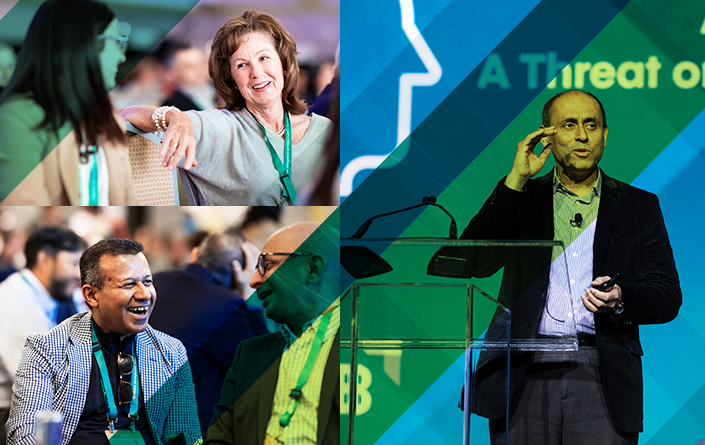Business Schools at the Heart of Our Communities
- Student-led projects can directly impact community businesses, improve city services, support sustainability, and encourage ethical leadership.
- When students immerse themselves in challenges close to home, they see firsthand the positive impact they can have in their own neighborhoods.
- As organizations participate in experiential learning, they provide feedback that informs faculty teaching and keeps schools connected to regional concerns.
Like many business schools, Nottingham Business School (NBS) at Nottingham Trent University in the U.K. prides itself on its connections with companies and organizations around the world. We are proud of how we immerse students at all levels in a global mindset—of how we encourage them to experience the business practices and cultures of different countries as they work on real-life projects.
However, as important as these global connections are, nowhere is our impact more noticeable than in our own backyards. After all, the health of local businesses feeds into the health of national and global economies.
All our students should graduate with a sound understanding of the complex and changing needs of all types of organizations—as well as the communities those organizations serve. I emphasize “communities,” because future business leaders will need to focus on more than financial performance. They will need to balance profitability with an emphasis on sustainability, environmental impact, ethical leadership, and the long-term needs of society.
Moreover, it is vital that our graduates understand how regional factors influence the health and operations of businesses—especially those in precarious financial positions. Their awareness of, and sensitivity to, these factors will stand them in good stead as they strive to become successful leaders who make positive contributions.
Learning From Day One
As part of our strategy at NBS and the larger university, we believe it is essential to enrich society by exposing our students, colleagues, and alumni to local business concerns. Starting on day one of our programs, we ask our students to work on real-world challenges for local organizations through three flagship undergraduate schemes:
NBS Discover. This required project takes place during the first week of the term before formal course sessions begin. NBS Discover challenges all first-year undergraduate students to think about how they can provide practical solutions for business and society by addressing an important issue that affects our immediate environment. For example, students might focus on the state of retail businesses in the city, the impact of fast fashion or single use plastics, or the need to develop more sustainable food options.
Guided by our academic team, students follow a structured program in which, on the first day, they hear a keynote lecture on the topic. On day two, they are divided into teams and then conduct research to gather evidence that will form the basis of the work they do throughout their first year of study. On day three, they visit the zone in the city that is relevant to their project. On day four, they attend a seminar and complete reflective writing exercises. Finally, on day five, they present their feedback on their project to the group.
Sustainability in Enterprise. For this project, now in its 10th year, final-year students can opt to provide carbon management consultancy services to local businesses as part of their mandatory Applied Business Research Project. Each year, up to 180 students work alongside managers “in company,” as they act as agents of change. They critically review sustainability issues that their clients present, analyzing evidence, practices, concepts, and data before formulating and presenting their sustainability and carbon management recommendations to the enterprise.
Over the past two years, our students’ work with nearby companies has reduced carbon emissions by 507,435 kg CO2e, an average reduction of more than 10 tonnes of carbon emissions per participating organization.
The project embeds active, participative, problem-based, experience-driven learning. Students design and lead changes as they recognize the sustainability challenges that organizations face. The number of businesses we help each year varies: Between 2021 and 2024, for example, 432 students formed 96 groups that supported 60 businesses, including making site visits and presenting their findings in final reports.
In many cases, our students’ recommendations have not simply been proposed—they have been implemented and externally audited. Our data show that, over the past two years, our students’ work with nearby companies has reduced carbon emissions by 507,435 kg CO2e. That represents an average reduction of more than 10 tonnes of carbon emissions per participating organization and nearly 2.5 tonnes per student.
NBS Bright. This activity is always a highlight for our final-year students. Around 1,800 of them work in small teams to solve real business challenges set by a large variety of organizations. These challenges might involve exploring new market opportunities, boosting staff recruitment and retention, creating a marketing plan, or conducting a local or global competitor analysis.
Often, our students have never heard of many of the participating companies, mainly because students typically consider only larger, well-known corporations for postgraduation employment. NBS Bright opens their eyes to the benefits of working for smaller organizations, where they can make tangible differences as part of more intimate teams.
The organizations that participate in NBS Bright are not exclusively local, but the majority are nearby and come back year after year with new requests. Additionally, many are small businesses that lack global networks. Our business school can offer something that these small and medium-sized enterprises truly value: the global and cultural perspectives of our international students.
This project complements Grads4Nottm, a two-week work experience for our final-year students and recent graduates that promotes Nottingham as an employment destination. Both NBS Bright and Grads4Nottm prompt students to think about staying in the area after graduation, thereby keeping their talent in the region.
Grads4Nottm projects have helped local organizations, including small, independent businesses. Students have worked with businessowners to market new products, make processes more sustainable, and even relocate to and design new premises.
What We Have Learned So Far
While our students work with a wide range of partners, we would like to encourage even more local businesses to participate in our experiential learning programs. We recently surveyed our partners to learn more about their motivations for participating in our student project initiatives.
The research team found that the opportunity for a knowledge exchange is not the only reason why organizations want to work with our students. They also enjoy being part of the students’ learning journeys and seeing them develop confidence. These organizations are happy to provide a safe space for students to learn, put their studies into practice, and even make mistakes.
Additionally, we have learned that the leaders of these organizations want to work with our students so that they can connect with our school and the larger university. For many, we’re a stepping stone toward achieving their personal goals and business objectives.
When we learn about the issues most important to local organizations, we can adapt our teaching, research, and business support accordingly and stay ahead of upcoming challenges.
That said, they often become allies to the university. Their work with students begins a two-way interaction, in which they not only receive beneficial recommendations, but also provide us with feedback that informs our teaching. They can tell us when students need to bolster their skills in contingency planning, for instance, or communication.
And, of course, through these connections, we can align our programs with these businesses. When we learn about the issues most important to them, we can adapt our teaching, research, and business support accordingly and stay ahead of upcoming challenges.
Lifelong Learning—Together
The benefits of working with these businesses extend to our executive education programs. Although exec ed students often are focused on developing their own skills or meeting the needs of their organizations, their experiential learning also can lead to regional improvements.
For example, the Nottingham Leadership Transformation Programme, now serving its fourth cohort, was developed in partnership with the Nottingham City Council to address the complex needs of the city. Each cohort involves representatives from the city council; the police, fire, and rescue departments; and the Integrated Care Board. Working on cross-organizational teams, participants address specific issues highlighted by the council, such as mitigating homelessness, improving safety, and decreasing the cost of living.
Rather than go straight into trying to solve a problem, participants are asked first to consider all the issues that have led to that problem. For example, when tackling homelessness, the members of one group identified all the ways that someone could fall through gaps in each city service. Using this knowledge, they then thought of how to close these gaps—and improve processes—across their organizations, including proposing a coordinated network of support hubs involving multiple city agencies.
Past participants have told us how they have made improvements in communication, decision-making, and overall management style and have received positive feedback from their colleagues. They have noted that the factors key to these successful transformations have included addressing change fatigue through transparent communication and support, developing a positive workplace culture, and embracing systemic leadership.
They also have expressed to us how important it is that our exec ed programs give city leaders from different statutory agencies time to learn together and forge networks. They develop ongoing partnerships through which they can share ideas and best practices and remove barriers to service. They can work together to deliver safer, more efficient, more cost-effective services to people in Nottingham.
Societal Impact Starts at Home
The best business schools are places that are deeply connected to their constituencies; they are places where knowledge is produced and disseminated for use in society. Their educational programs and initiatives have a tangible impact on the economy, the environment, and society.
Knowing this, business schools must adapt and evolve their value propositions to incorporate a more holistic view of societal impact. In addition to preparing students for the new world of work, schools must play more central roles in securing the well-being of the local population by weaving themselves into their communities. One of the best ways to achieve this goal is to view student projects as opportunities not only to deliver valuable experiential learning, but also to effect positive change in their regions.
After all, business isn’t just something to be taught—it’s something to be lived.





